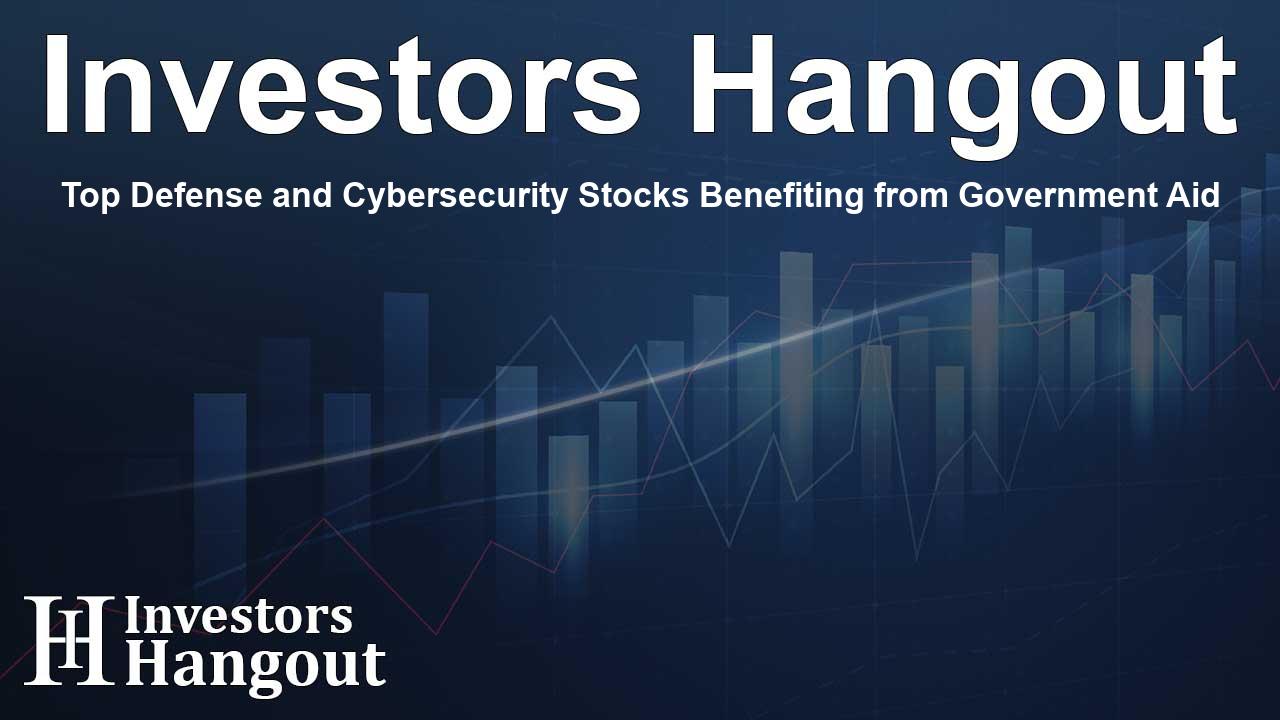Top Defense and Cybersecurity Stocks Benefiting from Government Aid

Top Defense and Cybersecurity Stocks Benefiting from Government Aid
The U.S. government has identified three crucial stocks that stand out during recent geopolitical challenges, awarding these companies substantial multi-million dollar contracts. For investors, this could be an excellent opportunity to delve deeper into these sectors as potential for significant growth appears imminent.
In recent years, hedge funds and sophisticated investors have looked at various data indicators to guide their investment strategies. While some data may require access to expensive resources or proprietary systems, much information is openly available and can yield substantial insights. One such critical indicator is the government contracts awarded to companies—these provide a clear signal of which entities are poised for growth.
Notably, the current focus rests on three key players in the defense and cybersecurity industries that have recently secured major government contracts. As tensions rise globally, especially in the context of national security, these companies are in a prime position to experience increased demand for their offerings.
Among these companies are General Dynamics (NYSE: GD) and Lockheed Martin (NYSE: LMT), both significant players in the defense sector, alongside Oracle (NYSE: ORCL), which specializes in cybersecurity solutions. The increasing geopolitical conflicts underscore the necessity of engaging these firms to bolster national security.
1. General Dynamics: Multi-Million Dollar Contract Drives Analyst Optimism
Recent reports indicate that General Dynamics has won a contract worth up to $614 million. This contract emerges amid escalating conflicts, reaffirming the necessity for robust military and technological support from the U.S government to its allies.
This newfound revenue stream has elicited a positive response from Wall Street analysts, who are optimistic about the company's growth potential. Currently, analysts suggest a price target of $317 per share for General Dynamics, translating to an anticipated increase of 6.7% from its current trading price. However, some analysts are even more bullish; for instance, Morgan Stanley expects the stock price could reach $345, implying an impressive 16.5% upside.
With an earnings per share (EPS) forecast of $4.22 for the coming year—up from the current $3.26—General Dynamics is expected to shine amidst its upward trajectory in share price and earnings. This level of growth is exceptional for a company valued at $81.1 billion.
2. Lockheed Martin: Government Support Fuels Stock Demand
Lockheed Martin remains a prominent name in the defense sector, currently trading close to its 52-week high, at 95%. The favorable market sentiment reflects investor confidence in Lockheed's viability during a time marked by ongoing military tensions.
Recently, analysts from the Royal Bank of Canada awarded Lockheed Martin an 'Outperform' rating and suggested an increase in price target to $675 per share, indicating a potential 12% upside from its present value. Such upgrades are timely, given the $599 million contract Lockheed Martin has secured from the government.
The market's willingness to support Lockheed Martin at a price-to-book (P/B) ratio of 21.4x, significantly above the aerospace sector average, indicates that investors are confident in the company's underlying growth potential and future earnings capability.
3. Oracle: Rising Cybersecurity Needs Amplify Government Contracts
As conflicts expand into the digital realm, Oracle is well-positioned to meet rising cybersecurity demands. The U.S. government recently awarded Oracle a notable $358.6 million contract aimed at enhancing national cyber defenses.
In response to this development, analysts at Sanford C. Bernstein have affirmed their 'Outperform' designation on Oracle’s stock, suggesting a price target of $202, signifying a potential 17% upside. Achieving this price would signal a new 52-week high for Oracle, setting a positive trend for the broader defense and cybersecurity sectors.
Frequently Asked Questions
1. What factors have contributed to the recent contracts awarded to these companies?
The escalating geopolitical conflicts have necessitated increased military and cybersecurity support, leading the government to seek out key defense firms for new contracts.
2. How are analysts viewing the future of General Dynamics?
Analysts are optimistic about General Dynamics, projecting significant revenue and earnings growth due to major government contracts.
3. What is Lockheed Martin's current market position?
Lockheed Martin is trading near its 52-week high and has received an upgraded price target from analysts, reflecting strong investor confidence.
4. How do government contracts impact Oracle’s stock performance?
Government contracts ensure steady revenue streams, which can lead to increased stock valuations and investor interest in Oracle's cybersecurity capabilities.
5. What overarching trends should investors watch in these sectors?
Investors should monitor geopolitical developments, government spending trends, and growth forecasts in defense and cybersecurity, as these factors influence stock performance.
About The Author
Contact Logan Wright privately here. Or send an email with ATTN: Logan Wright as the subject to contact@investorshangout.com.
About Investors Hangout
Investors Hangout is a leading online stock forum for financial discussion and learning, offering a wide range of free tools and resources. It draws in traders of all levels, who exchange market knowledge, investigate trading tactics, and keep an eye on industry developments in real time. Featuring financial articles, stock message boards, quotes, charts, company profiles, and live news updates. Through cooperative learning and a wealth of informational resources, it helps users from novices creating their first portfolios to experts honing their techniques. Join Investors Hangout today: https://investorshangout.com/
The content of this article is based on factual, publicly available information and does not represent legal, financial, or investment advice. Investors Hangout does not offer financial advice, and the author is not a licensed financial advisor. Consult a qualified advisor before making any financial or investment decisions based on this article. This article should not be considered advice to purchase, sell, or hold any securities or other investments. If any of the material provided here is inaccurate, please contact us for corrections.
